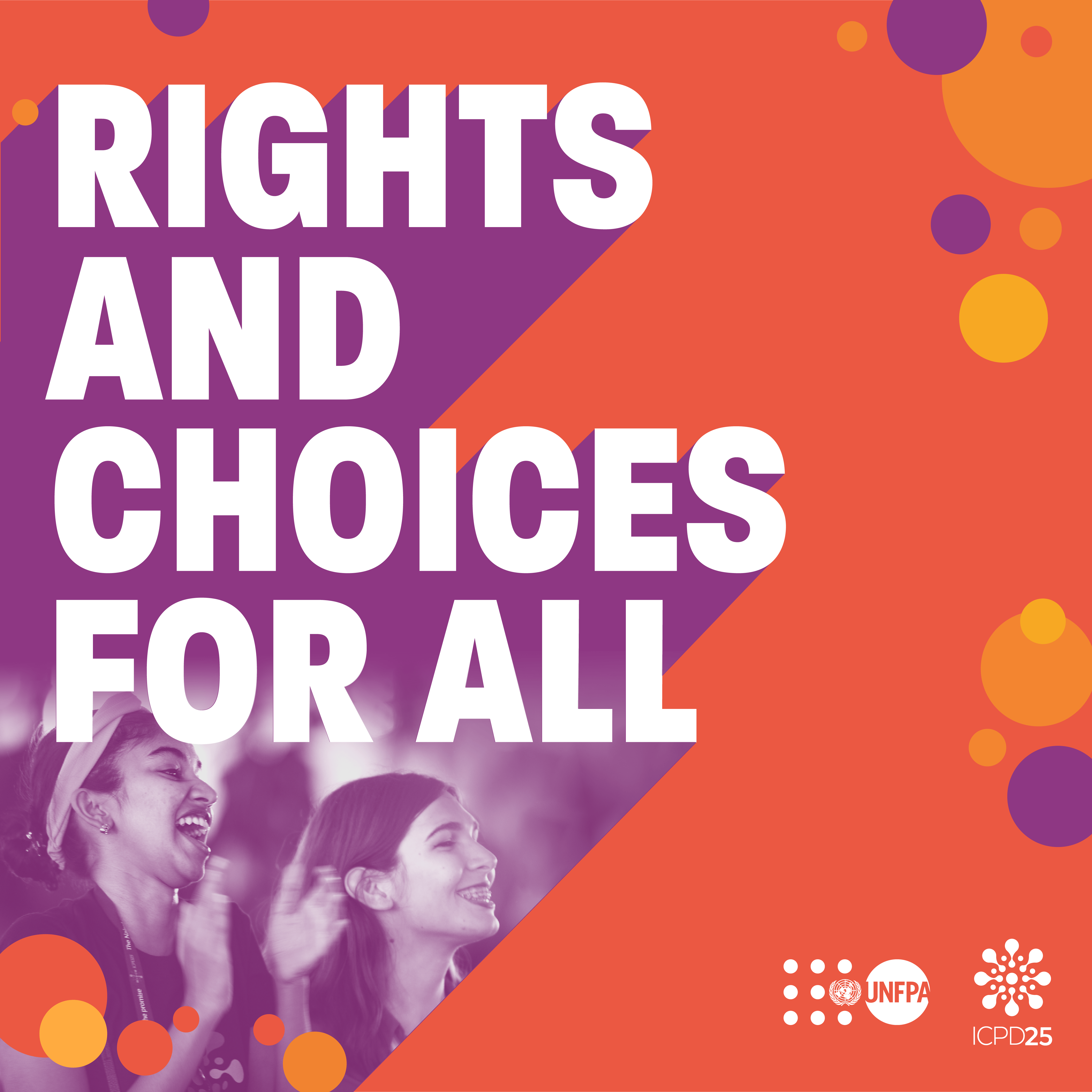A year has passed since the ICPD25 summit took place in Nairobi. Representatives of all segments of society from different countries gathered to present their intentions and action plans to achieve the long-term goals of the Program of Action of the International Conference on Population and Development, which was established 25 years ago. A special priority of UNFPA's global work in this direction is the movement to three zeros: zero unmet need for contraception, zero maternal mortality, and zero tolerance for gender-based violence.
Achieving the aims of the Program still remains in the future, so the consistent and coordinated work of stakeholders in all fields continues. The countries signed 1,200 commitments, and more than 9,500 delegates from around the world joined the summit.
The United Nations Population Fund implements its program of cooperation with Ukraine so that everyone can realize their potential: young people can be successful and develop in their communities; victims of violence can receive quality social and psychological services and protection, and every girl and woman can freely choose a profession and make choices concerning their reproductive health. Through campaigns and extensive collaboration with partners, NGOs, the state, and foreign governments, the Fund achieves protection of rights and realization of the potential of those who need it most. In particular, very important work with Maria Efrosinina, UNFPA Ukraine Honorary Ambassador. Maria participated in the Summit in Nairobi and had an opportunity to talk about gender issues in Ukraine.
One year has passed after the Nairobi summit, where delegates from different countries declared the importance of the movement to eradicate violence, gender equality, and a healthy society. Thus, we spoke with representatives of companies and institutions that joined the cooperation - and asked about their achievements this year.
Combating gender-based and domestic violence
Women continue to suffer disproportionately from domestic and gender-based violence, a thesis mentioned even in the Istanbul Convention. Combating these phenomena is an integral part of the fight against discrimination, and a society of equal opportunities is impossible without combating domestic and gender-based violence. In this area, Ukraine also made commitments at the Nairobi summit.
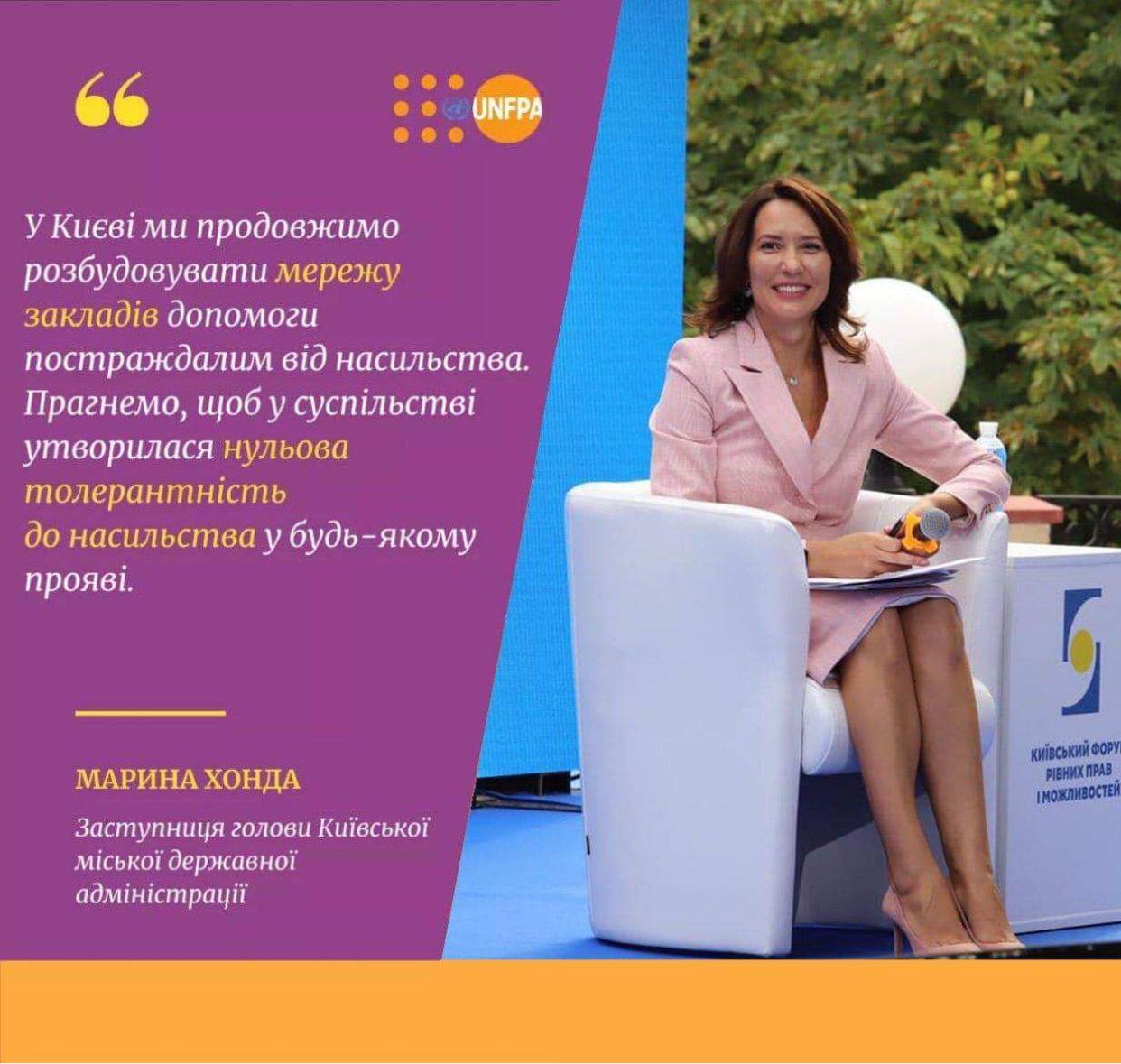
Kyiv has become one of the cities that has joined the UNFPA-supported “Cities Free from Domestic Violence” program with the support of the UK Government. Maryna Honda, deputy head of the Kyiv City State Administration, says that the main achievement of the year is that more and more people have started talking about violence openly, without hiding these facts. “We constantly run information campaigns, willing to explain how to recognize violence and what to do in emergency situations. We have opened a hotline for psychological support for survivors of violence "15-00" and set up several institutions to help survivors. Cooperation has been established between all social services and the police", - says Maryna.
A memorandum of cooperation with the United Nations Population Fund was signed last year, and establishing the framework for combating and preventing violence at the city level has begun in Kyiv. The Kyiv City Center for Gender Equality, Prevention, and Counteraction to Violence has been established to coordinate the work of social services. It has a shelter for female victims of domestic violence, as well as a crisis room for survivors of domestic violence. The first such room was opened in May this year, and the second will open soon.
"Crisis rooms" are essential for building a system of combating violence, because they help survivors in crisis situations when they have nowhere to go. They can stay in these institutions for up to 10 days, receive legal and psychological support, assistance in recovering documents. Another significant feature is that survivors can stay here with children. If a woman needs more time, we can send her to a shelter", says Maryna Honda.
Also, the city is currently developing a relevant city target program. According to the city administration, it will make it possible to fight not only domestic violence but also human trafficking more effectively and will also help to establish gender equality. At the same time, the development of "crisis rooms" will continue, and the more global goal is to ensure that "zero tolerance" for violence in any form is formed in society.
Local authorities have a big role to play in the fight against domestic violence because they are the ones who see the real picture. Under the law, they are also responsible for working effectively to combat violence and influence the funding and establishment of social services.
A crucial step was the signing in late September 2020 by the President of Ukraine of the Decree "On urgent measures to prevent and combat domestic violence, gender-based violence, protection of the rights of victims of such violence." UNFPA, the United Nations Population Fund, provided expert assistance in drafting the Decree. The problem of domestic violence has long been acute in Ukrainian society. Its recognition at the state level is a vital step in overcoming it and serves as proof that this aspect is an integral part of the domestic and foreign policy of our government. This document should help protect survivors of domestic violence and help build efficient infrastructure on the local level.
Effective work is impossible without coordination with law enforcement agencies. For the Ministry of Internal Affairs, preventing and combating domestic violence is one of the key aspects of work.
Kateryna Pavlichenko, Deputy Interior Minister, spoke about the agency’s success: "Consolidating efforts, the Ministry of Internal Affairs cooperates with both state institutions and NGOs. In particular, we have already strengthened institutional capacity, reset the mechanisms for responding to domestic violence and improved them through involving many national police units within their competence, reviewed and updated police training curricula in higher education institutions of the Ministry of Internal Affairs, primary police training institutions, in particular in the framework of advanced training, as well as included relevant topics in police training, expanded large-scale information campaign at all levels, including the use of social media".
Talking about the informational and educational aspect of the agency's activities, Kateryna also adds that the ministry uses all possible platforms to share information: for example, the chatbot #ActAgainstViolence in Viber and Telegram, as well as the training series "Online tools to combat domestic violence", created in cooperation with the Ministry of Digital Transformation for the platform Diia: Digital Education.
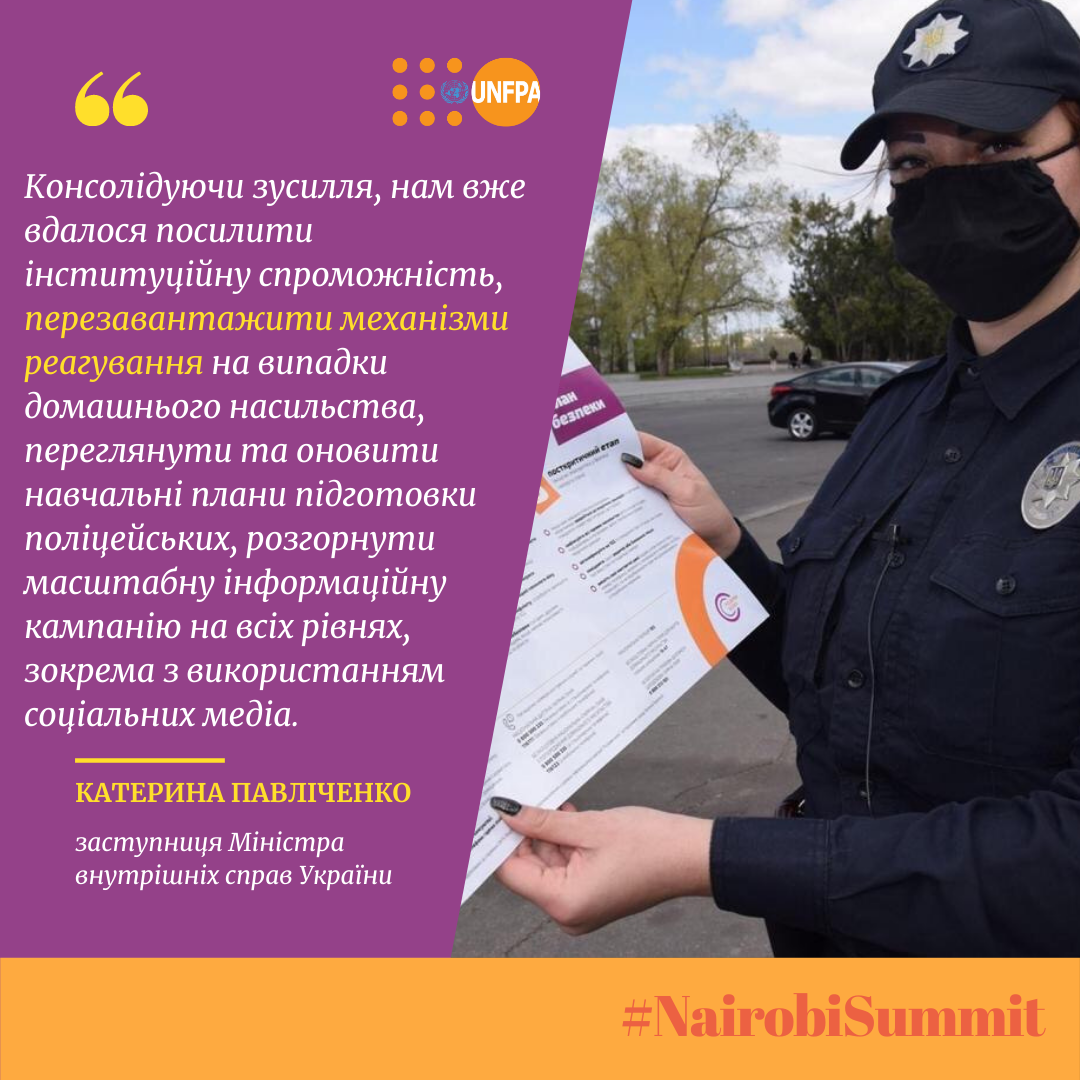
Another form of educational activities, that was joined by the Ministry of Internal Affairs, is the World Action "16 Days Against Violence".
“We have initiated, in cooperation with the Office of the Deputy Prime Minister for European and Euro-Atlantic Integration and with the involvement of our permanent and reliable partners, including the United Nations Population Fund, the exhibition "The Thing Is…”. We will not reveal details just yet, but we invite everyone to the opening of the exhibition on November 25 at 10:00 in Kyiv on Mykhailivska Square", says Kateryna Pavlichenko.
It is crucial that, apart from the state and non-governmental organizations, businesses are actively involved in projects related to combating violence and promoting gender equality. They are not indifferent to the counteracting violence. In particular, last year the United Nations Population Fund formed a coalition of companies and partners committed to working towards these goals. The coalition includes 27 companies that promote the implementation of equal opportunities policies for women and men and the prevention of domestic violence.
Gender Equality
Ensuring gender equality is extremely important for building peaceful communities, where everyone has the opportunity to reach their full potential. And it is essential everywhere, and especially in sports, where girls do not have many role models.
FC Shakhtar, one of the most successful and famous football clubs in Ukraine, believes that it is necessary to create an opportunity to play football for everyone, regardless of gender.
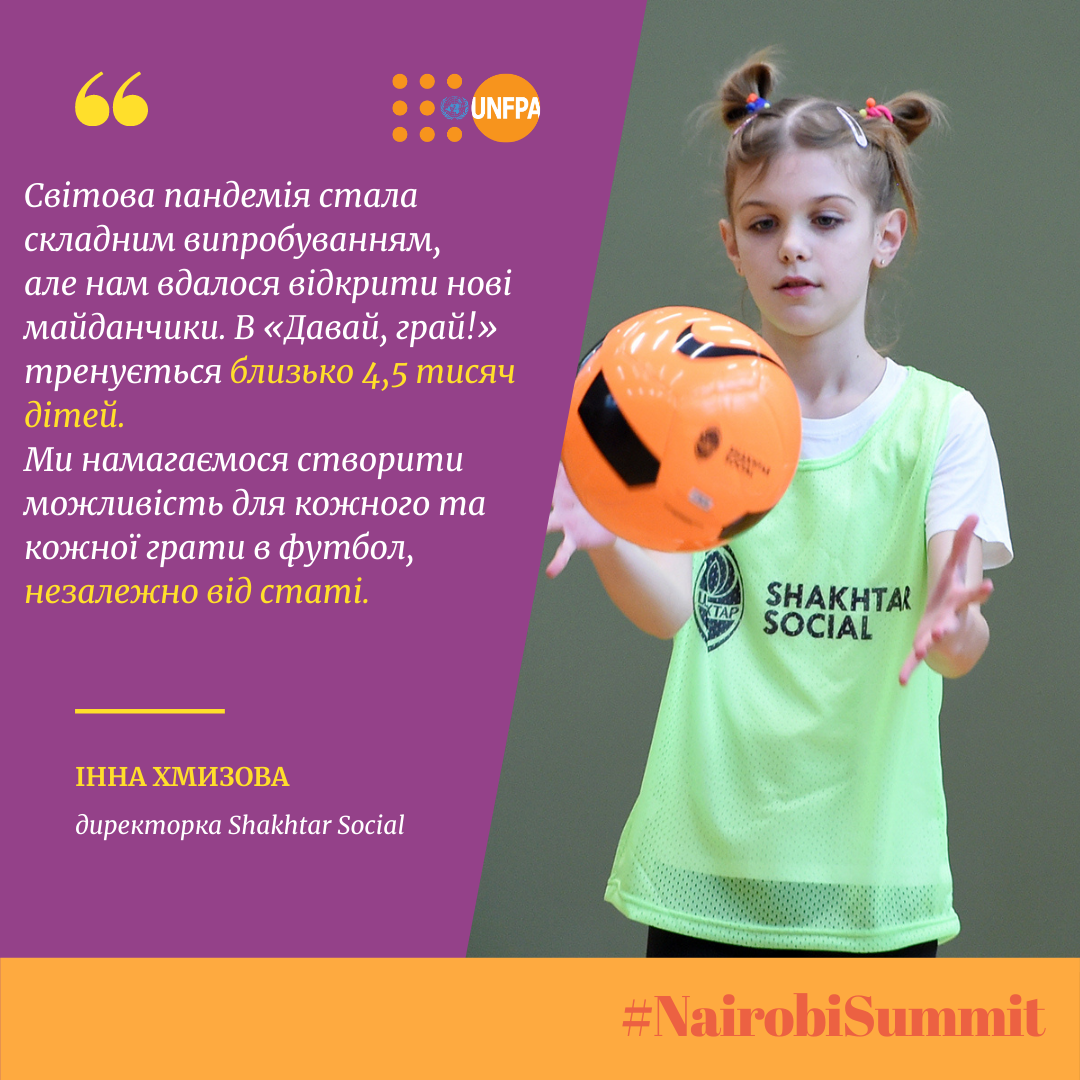
"We at FC Shakhtar believe that today a big club is one that has an academy, male and female teams and not only football ones. Therefore, two years ago, we opened a girls' football team in Kharkiv," said Inna Khmyzova, head of Shakhtar Social. The project "Come on, play!", implemented by the club, involves girls and boys aged 7 to 12 years. According to the latest data, about 4.5 thousand children train in "Come on, play!". The project works in 36 localities on 66 sites.
Women's football, says Inna, is a very promising, yet underdeveloped at the moment, area. Of course, the economic capacity of the club also plays an important role, so in Europe, women's teams can be found much more often than in Ukraine.
The biggest challenge of the year, says Inna Khmyzova, was a pandemic. "But even despite the problems, we managed to open sites in Myrnohrad, Lviv (inclusive), Poltava (inclusive), Enegrodar, Kharkiv (2 sites), and Kyiv," shared Inna.
Education
Education remains a priority at all times since changes in society and the success of future generations depend on it. The Center for Corporate Development of Social Responsibility has made a commitment to this area. Maryna Saprykina, head of the Center, says their commitment in Nairobi concerned access to education, equality, and the opportunity to get the first job.
"For the last 5 years, we have been developing the areas of career realization of youth, gender equality in STEM, as well as the promotion of a healthy lifestyle. Also, we are implementing all-Ukrainian initiatives "Pact for Youth", "STEM Girls" and "Healthy Challenge", - says Maryna Saprykina, describing the Center’s activities.
The Center has several fields of work, for example, the promotion of STEM-professions among girls, certification of youth-friendly enterprises, the advocacy for a healthy lifestyle among young people from vocational schools. In particular, the National Girls' Day in Technology has been initiated and held for three years, and about 500 teachers have participated in hackathons to teach STEM subjects without stereotypes.
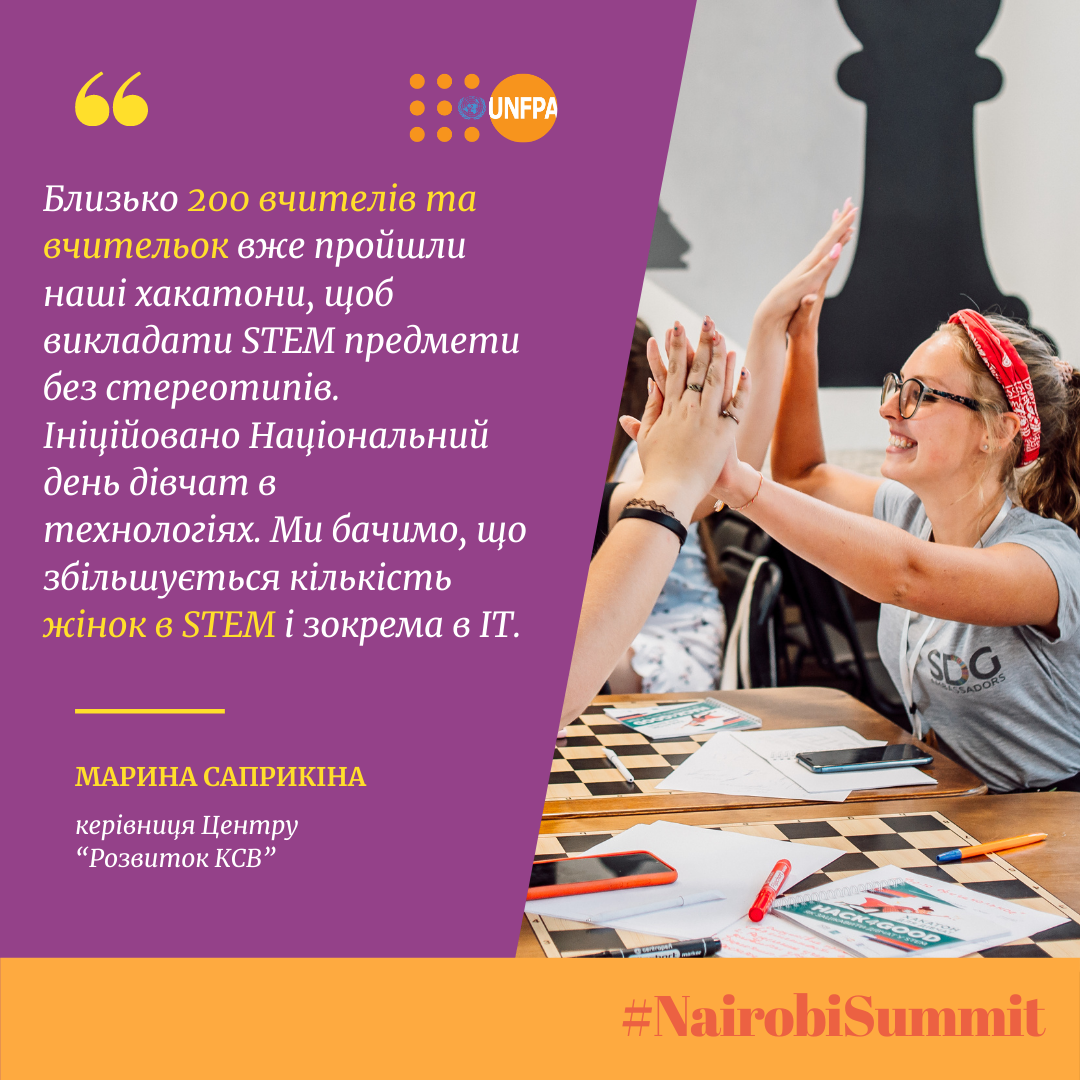
“Gradually, we can see that the number of women in STEM and in particular in IT is increasing. Of course, it is difficult to measure our contribution, but we know that systemic change is created like waves. That is why we are definitely launching waves of change and partnerships. But there are projects where we know for sure that 50% of girls who have undergone mentoring programs with inspiring women in STEM - have entered the STEM specialty", - says Maryna Saprykina.
The Pact for Youth is another vast initiative. It brought together 140 employers, who together created more than 45,000 jobs for young people, of which more than 10,000 were established last year.
Asked why such commitments are crucial to society, Maryna said it is both a vision and a call to action that helps bring together a wide range of stakeholders: the public, business, government, and international partners.
"It is a voluntary thing that attracts the attention of other organizations - and such commitments are growing. It is about leadership and accountability. If you make a commitment, you can't escape from it, because they are public, and you have to report on them. Commitments become a compass for organizations, and they help to focus the organization's attention on big things. That is why it is important to make commitments, and even more important - to fulfill and report them”, Maryna concludes.
Reproductive Health
An equally important aspect of a healthy society is women's health and reproductive freedom. The Women's Health and Family Planning Charitable Foundation exists since 1996 and has been working on the frontline in Eastern Ukraine for the past five years. According to Halyna Maistruk, head of the Women's Health and Family Planning Foundation, the activities of the mobile teams are aimed not only at women but also at men and children - the entire population living in the conflict zone. But at the same time, women are provided with specialized care. For example, since July 2020, with the support of the British government and in partnership with UNFPA, mobile clinics have appeared in Donbas. They conduct examinations, provide medical services, and can detect hidden cases of domestic and gender-based violence.
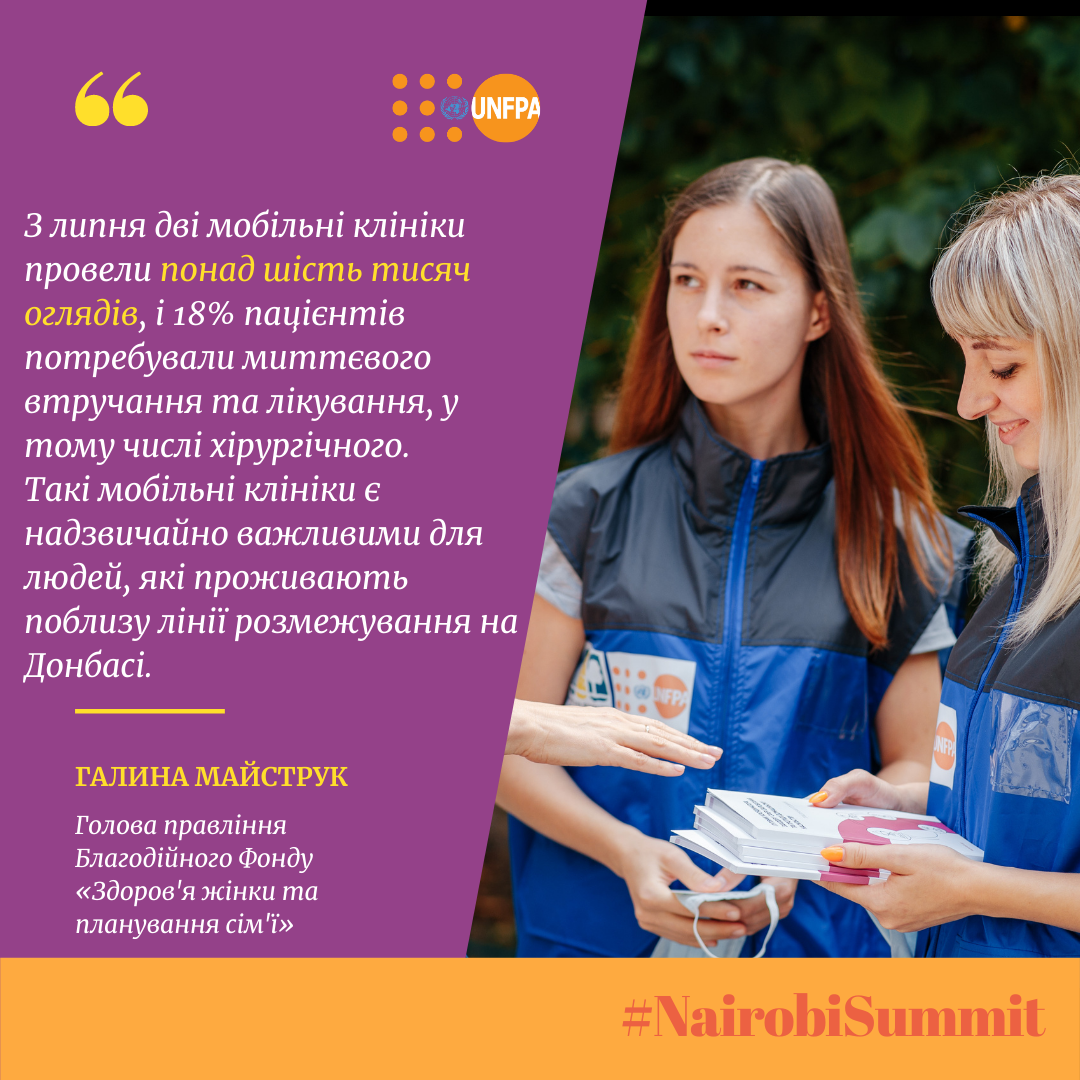
In October 2020 alone, such mobile clinics provided care - both medical and psychological - to almost two thousand patients living in settlements on the line of demarcation. Such mobile clinics play a key role in these areas, as many elderly people, people with disabilities live there, and many settlements do not have access to quality medical services permanently. Since July, the two mobile clinics have conducted more than 6,000 examinations, and 18% of patients required immediate intervention and treatment, including surgery.
"Services are provided not only to women who have suffered from sexual violence but also to women who have suffered from domestic violence," says Halyna Maistruk. But the most important aspect of the work says Halyna, is to increase the level of knowledge and the ability of medical workers to provide such services. The foundation worked with obstetricians and gynecologists, as well as with dermatovenereologists, and with AIDS centers. For the last two years, intensive work has been carried out with the primary link in the provision of medical services - family doctors, because they are the main source of violence prevention: they work directly with families, with communities, and know the situation first-hand.
“The difference is that when a woman deals with a situation where this sexual violence has already taken place, it is, in fact, the consequences that need to be optimized in some way, the risks should be reduced, and rehabilitation is possible: physical and psychological. And the primary link of medical care is, in fact, able to detect these cases at the routine level, to redirect people for psychological assistance. And this applies not only to physical violence but also to psychological and economic abuse”, says the head of the Women's Health and Family Planning Charitable Foundation. It is also important that a significant part of the foundation’s work consists of coordination with other services because such issues are not solved by one organization alone.
Only by coordinating efforts on all levels - at the state level, business, public, can we achieve real success and move to "three zeros". Education, gender equality, reproductive health, and combating violence are all inextricably linked.
The most important thing is that the work continues. Despite the pandemic and the consequences it has on the economy and society, it is important not to step down and work without leaving anyone behind.

